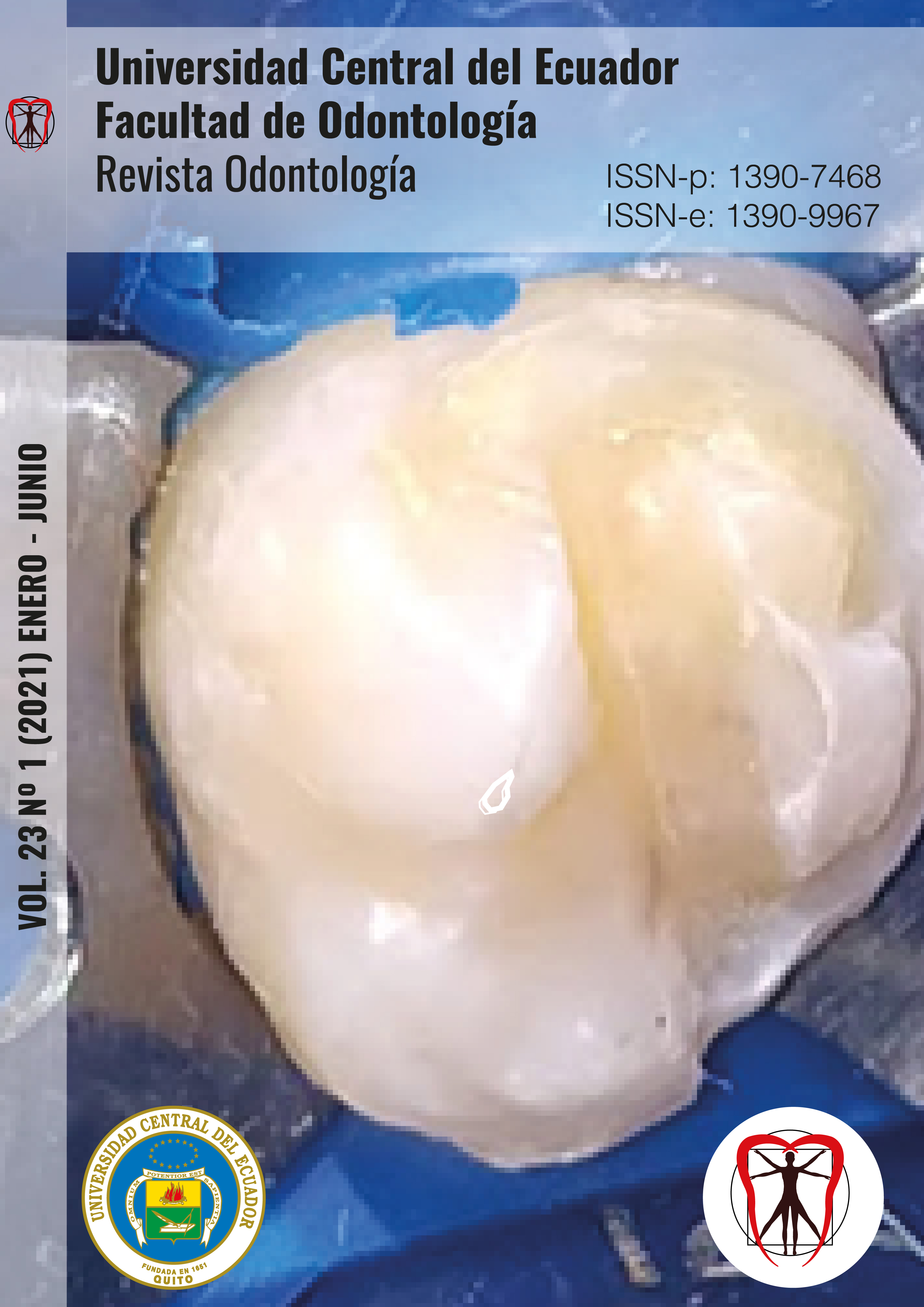Correlation between dyschromatopsia and the ability to discriminate in the tooth shade selection
DOI:
https://doi.org/10.29166/odontologia.vol23.n1.2021-e3285Keywords:
dyschromatopsy, chromatic discrimination, tooth shade selection, discromats, trichromatsAbstract
Whitin a successful aesthetic rehabilitation treatment, the shape, texture and color are considered or are considered, and in the latter, its selection can be altered by envoriment factors as well as individual clinical factors such as dyschromatopsia, which may cause a chromatic appreciation error. Objective: To determine the relationship between dyschromatopsia and the ability to discriminate in the tooth shade selection. Methodology: 308 students from the last semesters of the Faculty of Dentistry of the Central University of Ecuador participated, and the Ishihara Test was applied to them to diagnose dyschromatopsia, forming the study group. The control group was conformed by trichromat students without visual acuity deficit. The dental chromatic appreciation assessment was made by means of six evaluations of value, hue and chroma using the Vita 3D Master Toothguide and Linearguide colorimeters. The T Student was used to compare the quantitative data; and finally the Pearson correlation to determine the association of the two variables. Results: it was determined that there is a statistically significant in the performance of the evaluations carried out among of the dyschromatic and trichromatic groups; with p 0,014. In the comparison of the errors made by the participants in each color dimensions of the groups a statistically significant variation was identified in the Value dimension, with a value of p 0,047. A correlation of 0,615 was obtained. Conclusion: Dyschromatopsia decreases the power of discrimination during tooth shade selection in the Value, unlike the Hue and Chroma. A moderate correlation between the study groups was determined.
Downloads
References
Callegari A, Brito e Dias R. Rehabilitación Estética. Abordajes Precisos y Actuales. Sao Paulo: AMOLCA Actualidades Médicas; 2015.
Christiani J., J.R D. Color: Dentistry Consideration and Instruments for Recording. Revista De Operatoria Dental Y Biomateriales. RODYB [Internet]. 2016;6. Disponible en: https://www.researchgate.net/publication/325049983_Color_consideracion_en_Odontologia_e_instrumentos_para_el_registro
Mokhtar HA, Abuljadayel LW, Al-Ali RM, Yousef M. The perception of smile attractiveness among Saudi population. Clin Cosmet Investig Dent. 2015 Jan 20;7:17-23. doi: 10.2147/CCIDE.S74764. PMID: 25653558; PMCID: PMC4309796.
Wagner S, Rioseco M, Ortuño D, Cortés MF, Costa C. Effectiveness of a protocol for teaching dental tooth color in students with color vision impairment. J Esthet Restor Dent. 2020 Sep;32(6):601-606. doi: 10.1111/jerd.12451. Epub 2018 Dec 28. PMID: 30593701.
Sakuma, Y., Kishimoto, N., & Momota, Y. Appropriate color codes for medical materials and devices in terms of color vision deficiency management to ensure patient safety. Journal of Osaka Dental University, 51(1), 31-38. doi:10.18905/jodu.51.1_31. 2017
Schmelling M. Color Selection and Reproduction in Dentistry . Part 1 : Fundamentals of Color Color Selection and Reproduction in Dentistry . Part 1 : Fundamentals of Color Selección de color y reproducción en odontología. ODOVTOS-Int J Dent [Internet]. 2016;1(JANUARY):23–32. Disponible en: https://www.scielo.sa.cr/pdf/odovtos/v19n1/2215-3411-odovtos-19-01-00023.pdf
Olms C, Jakstat H. Learning Shade Differentiation Using Toothguide Trainer and Toothguide Training Box: A Longitudinal Study with Dental Students. J Dent Educ [Internet]. 2016;80(2):183–90. Disponible en: https://pubmed.ncbi.nlm.nih.gov/26834136/
Igiel C, Weyhrauch M, Wentaschek S, Scheller H, Lehmann KM. Dental color matching: A comparison between visual and instrumental methods. Dent Mater J [Internet]. 2016;35(1):63–9. Disponible en: https://www.researchgate.net/publication/292386594_Dental_color_matching_A_comparison_between_visual_and_instrumental_methods/link/56bcabf008ae9ca20a4c9d1c/download
Marechal, M. Elsevier: Dyschromatopsies hereditaires : physiologie, classification, diagnostic et application à l’aéronautique. 2018 Available from: https://pubmed.ncbi.nlm.nih.gov/30704748.
Ragain J. A Review of Color Science in Dentistry: The Process of Color Vision. J Dent Oral Disord Ther [Internet]. 2015;3(1):01–4. Disponible en: https://symbiosisonlinepublishing.com/dentistry-oraldisorders-therapy/dentistry-oraldisorders-therapy34.php
Ishihara SM. The Series of Plates Designed as a Test for Colour Deficiency. Concise Ed. Tokio: Kanehara Trading INC; 2009.
Khosla A, Maini AP, Wangoo A, Singh S, Mehar DK. Prevalence of colour vision anomalies amongst dental professionals and its effect on shade matching of teeth. J Clin Diagnostic Res [Internet]. 2017;11(1):ZC33-ZC36. Disponible en: https://www.ncbi.nlm.nih.gov/pmc/articles/PMC5324491/
Fanlo Zarazaga, A., Gutiérrez Vásquez, J., & Pueyo Royo, V. 2019. Review of the main colour vision clinical assessment tests. Arch Soc Esp Oftalmol, 94(1), 25-32. doi:10.1016/j.oftal.2018.08.006.
Radner W. Reading charts in ophthalmology. Graefe’s Arch Clin Exp Ophthalmol [Internet]. 2017;255(8):1465–82. Disponible en: https://www.ncbi.nlm.nih.gov/pmc/articles/PMC5541099/
Borbély J, Varsányi B, Fejérdy P, Hermann P, Jakstat HA. Toothguide Trainer tests with color vision deficiency simulation monitor. J Dent [Internet]. 2010;38(SUPPL. 2):41–9. Disponible en: https://www.sciencedirect.com/science/article/abs/pii/S0300571210001892?via%3Dihub
Masami I. True colors: Seeking equality in the way we see the world. el 16 de mayo de 2016; Disponible en: https://www.japantimes.co.jp/life/2016/05/14/lifestyle/true-colors-seeking-equality-way-see-world/#.XvLH55pKjIW
Osakit T. Japan earthquake task force to redesign hazard maps to aid people with color vision deficiencies | The Japan Times. el 21 de agosto de 2019 [citado el 24 de octubre de 2019]; Disponible en: https://www.japantimes.co.jp/news/2019/08/21/national/quake-maps-color-vision-deficiency/#.XvNyD5pKjIV
Cisneros YA, Vargas GDL, Valladares MS, Álvarez GO, María R, Romero D. Artemisa relación con el poder de discriminación en la toma de color dental en alumnos de odontología con luz artificial y natural. ADM. 2008;LXV(2):69–74.
Suat Gokce H, Piskin B, Ceyhan D, Mermut Gokce S, Arisan V. Shade matching performance of normal and color vision-deficient dental professionals with standard daylight and tungsten illuminants. J Prosthet Dent [Internet]. 2010;103(3):139–47. Disponible en: http://dx.doi.org/10.1016/S0022-3913(10)60020-0
Poljak-Guberina R, Celebic A, Powers JM, Paravina RD. Colour discrimination of dental professionals and colour deficient laypersons. J Dent [Internet]. 2011;39(SUPPL. 3):e17–22. Disponible en: http://dx.doi.org/10.1016/j.jdent.2011.09.008
Vafee F, Rakhshan V, Vafaei M, Khoshhal M. Accuracy of Shade Matching Performed by Colour Blind and Normal Dental Students Using 3D Master and Vita Lumin Shade Guides. Eur J Prosthodont Restor Dent [Internet]. 2013;21(1):44–8. Disponible en: http://www.scopus.com/inward/record.url?eid=2-s2.0-84879353354&partnerID=40&md5=ad5e2f30681867fa5b32c3feba3e9ba3
Mushtaq F, Baraas RC, Al-Saud LM, Mirghani I, Van Der Zee C, Yates E, et al. Should prospective dental students be screened for colour vision deficits? Br Dent J [Internet]. 2016;221(5):227–8. Disponible en: https://www.nature.com/articles/sj.bdj.2016.633.pdf
Davison SP, Myslinski NR. Shade selection by color vision-defective dental personnel. J Prosthet Dent [Internet]. 1990;63(1):97–101. Disponible en: https://www.sciencedirect.com/science/article/abs/pii/002239139090276I#!
Downloads
Published
How to Cite
Issue
Section
License
Copyright (c) 2021 Andrea Estela Gamboa Recalde, Silvia Jessenia Campoverde Nivicela, Blanca Emperatriz Real López

This work is licensed under a Creative Commons Attribution-NonCommercial-NoDerivatives 4.0 International License.


